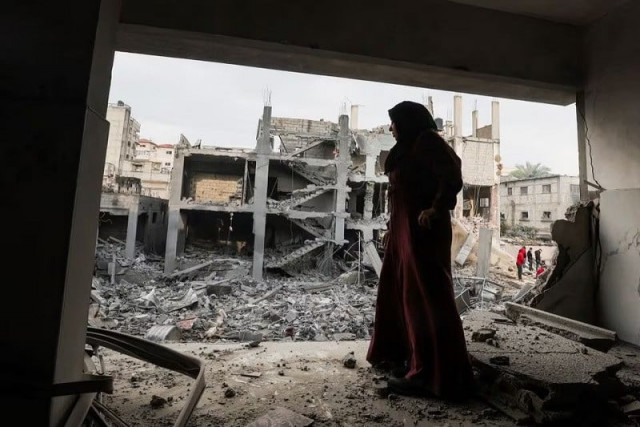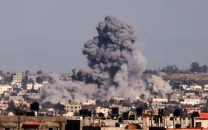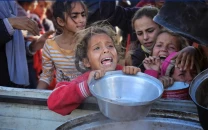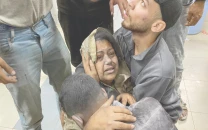Israeli strikes the length of Gaza as US calls for more accurate targeting
US envoy urges precision as Israel escalates Gaza attacks; rising civilian casualties raises humanitarian concerns

Israel pounded the length of the Gaza Strip on Wednesday, killing families in their homes even as Washington dispatched an envoy to encourage its ally to be more precise in its war against Hamas.
Two weeks after a truce collapsed, the war has entered an intense phase, with fighting now raging across the entire Palestinian enclave and international organisations warning of a complete humanitarian catastrophe.
In Rafah, jammed with people in makeshift tents on Gaza's southern edge, women and men wept at the morgue where the bodies of those killed in the latest overnight air strikes were laid out wrapped up in bloodied shrouds. Some were small children.
The adjacent homes of the Abu Dhbaa and Ashour families had been obliterated by a massive air strike, and residents were picking folornly through the rubble. Gaza health authorities said 26 people had been killed there.
Neighbour Fadel Shabaan had rushed to the area after the bombing.
"It was difficult because of the dust and people's screams. We went there and we saw our neighbour who had ten martyrs. This is a safe camp, there is nothing here, the children play soccer in the street," he said.
IDF blowing up a large building in Gaza. pic.twitter.com/HqtVUzmPzI
— Clash Report (@clashreport) December 14, 2023
Israel has brushed off calls for a ceasefire, including a resolution at the UN Security Council blocked by a US veto last week and another that passed overwhelmingly in the General Assembly this week.
Washington has provided diplomatic cover for its longstanding ally, but expressed increasing alarm over civilian deaths. President Joe Biden went further this week, describing Israeli bombing as "indiscriminate".
White House national security adviser Jake Sullivan, who will be in Israel on Thursday and Friday, will discuss with the Israelis the need to be more precise with their strikes, spokesperson John Kirby said.
Up to 45% of the 29,000 air-to-ground munitions that Israel has dropped on Gaza since Oct. 7 have been unguided "dumb bombs" according to a US intelligence assessment reported by CNN.
Agriculture Minister Avi Dichter, a member of Israel's security cabinet and Prime Minister Benjamin Netanyahu's Likud party, rejected Biden's characterisation of Israels strikes as indiscriminate.
"There is no such thing as 'dumb bombs'. Some bombs are more accurate, some bombs are less accurate. What we have is mostly pilots who are precise," he told Army Radio. "There is no chance that Israel's air force or other military units fired at targets that were not terror targets."
'Where can we go now?'
Israel launched its campaign in retaliation for a rampage by Hamas, the group that rules Gaza, whose fighters killed 1,200 Israelis and seized 240 hostages in a cross-border raid on Oct. 7. Since then, Israeli forces have besieged the coastal strip and laid much of it to waste, with nearly 19,000 people confirmed dead according to Palestinian health officials and thousands more feared buried under the rubble.
Nearly all of Gaza's 2.3 million residents have been forced from their homes, many several times. Food and medical supplies are running out and international aid bodies say they fear mass death from hunger and disease.
Despite Israel's pledges to reduce harm to civilians, it has extended its ground campaign from the north to the south this month, leaving no part of the enclave unscathed. It says it is offering warnings where it can before striking an area.
Israeli army distributed leaflets offering monetary rewards to those who reported the location of senior Hamas officials in Gaza.
— Clash Report (@clashreport) December 14, 2023
$400,000 for Yahya Sinwar
$300,000 for Muhammad Sinwar
$200,000 for Khan Younis Brigade commander Rafa Salama
$100,00 for Muhammed Deif pic.twitter.com/eVjc5Rpp12
In the main southern city Khan Younis, where advancing Israeli forces reached the centre this week, a whole city block had been bombed overnight to dust. Though most people had fled after Israeli warnings, neighbours digging with a hand shovel believed four people were inside. One body had been recovered.
"It is a total destruction. May God take revenge on them," Nesmah al-Byouk, returning to the ruins of the home she had fled three days ago, told Reuters. "We came and saw everything destroyed, the house, the factory, our neighbours and house are all gone. Where we can we go to now?"
Revenge
In the north, including the ruins of Gaza City, fighting has only escalated since Israel announced that its troops had largely completed their military objectives last month. Ten Israeli soldiers died on Tuesday including officers up to the rank of colonel, most killed in an ambush in a market area of Gaza City's Shejaiya district, the worst losses since October.
Um Mohammad, 53, a mother of seven still living in Gaza City about 1.5 km (a mile) from Shejaiya, said the sound of intensified bombing overnight indicated the Israelis were seeking vengeance.
"The resistance hurt them badly there and they are trying to get revenge by bombing the civilians and destroying homes," she said.
The Israeli military said its troops had dismantled a "central operating site" of Hamas forces in a school in Shejaiya and destroyed two tunnel shafts, a rocket launch pit and a weapons storage facility in Khan Younis.
Also in the north in Jabaliya, Gaza's health ministry said Israeli forces had stormed a hospital, detaining and abusing medical staff and preventing them from treating a group of wounded patients, at least two of whom had died.
More than 70 Palestinian man have been detained by IDF near Kamal Adwan Hospital - the largest hospital in Jabaliya and one of the largest in the north of the Gaza Strip. pic.twitter.com/QHdFZlR74L
— Clash Report (@clashreport) December 14, 2023
Twelve children were in the intensive care unit where the electricity had been cut and there was no milk, Gaza health spokesperson Ashraf al-Qidra said.
Israel's military said fighters had been operating inside the hospital, 70 of whom had surrendered there "with weapons in hand" and were now undergoing interrogation. Reuters could not independently reach the area.
Shaban, 45, an electrician in Khan Younis, said residents, most already displaced, were desperately seeking new places to flee, expecting further Israeli advances.
"People are heading west to al-Mawasi by the beach, where it is a cold open area, or to Rafah which has become overcrowded with no space for more."
He now lives in al-Mawasi with 50 people from six families in one house. Women are on the ground floor, men and children on an unfinished floor upstairs.
"At night it feels like Siberia."



















COMMENTS
Comments are moderated and generally will be posted if they are on-topic and not abusive.
For more information, please see our Comments FAQ